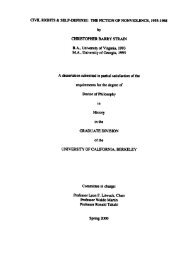Negro Digest - Freedom Archives
Negro Digest - Freedom Archives
Negro Digest - Freedom Archives
Create successful ePaper yourself
Turn your PDF publications into a flip-book with our unique Google optimized e-Paper software.
works by Charles W . Chesnutt whose<br />
first story was published in 1887, and<br />
whose racial identity was for some<br />
years not made public ; Paul Laurence<br />
Dunbar, the master of dialect who<br />
died in 1906 at the tender age of 34 ;<br />
Frederick Douglas ; and W . E . B .<br />
DuBois . One might, in reading Douglas'<br />
"Letter To His Master" (or rereading<br />
it, as the case might be),<br />
make certain connections between<br />
then and now . Nuances in his fierce<br />
pride remind this reader of current<br />
literary celebrant Eldridge Cleaver,<br />
and, more, in this work by Douglas<br />
there is, unmistakably, the sense that<br />
man achieves goodness by wanting<br />
the freedom of others, a quality critics<br />
have cited in praising the existentialist<br />
novels of one John Updike<br />
. The section is concluded with<br />
a poem and a chapter from The<br />
Souls of Black Folk, by W . E. B .<br />
DuBois, whose awakening was indeed<br />
early! One agrees with the editors<br />
that "no brief selection from his<br />
voluminous work could do justice to<br />
this man of the world," but how<br />
schizoid the mind that would make<br />
such a recognition and yet omit hint<br />
from inclusion in Major Authors . (Or<br />
was that political-as surely must<br />
have been the case as regards LeRoi<br />
Jones, who is represented in the section<br />
on Contemporary Literature by<br />
three poems?)<br />
The <strong>Negro</strong> Awakening includes<br />
the works of James Weldon Johnson,<br />
Alain Locke . Claude McKay, Jean<br />
Toomer, Rudolph Fisher, Eric Walrond,<br />
Sterling A . Brown and Countee<br />
Cullen . It marks the period better<br />
known as the <strong>Negro</strong> Renaissance, the<br />
1920's, that era in which black writers<br />
came together in their separateness<br />
and dived into the literary seas<br />
only to come out (to borrow a line<br />
from Claude McKay's "Baptism")<br />
a stronger soul within a finer frame .<br />
The scholarship of Alain Locke's<br />
"The New <strong>Negro</strong>," and the singularly<br />
classic work of criticism by Sterling<br />
8 2<br />
A . Brown, "<strong>Negro</strong> Character as Seen<br />
by White Authors," are outstanding<br />
in this section. The excerpts from<br />
Cane (recently reissued by Harper<br />
and Row as a Perennial Classic) reveal<br />
the extraordinary gift of Jean<br />
Toomer, the man who so early deserted<br />
the naturalistic fiction and<br />
who, had he not ceased writing, most<br />
certainly would have contributed<br />
much to that deeper exploration of<br />
the consciousness, psychic and cosmic,<br />
ongoing in the literature of the<br />
past 30 odd years .<br />
"Flying Home" and "King of the<br />
Bingo Game" by Ellison, "The Man<br />
Who Killed a Shadow" by Wright,<br />
and Baldwin's "Sonny's Blues" are<br />
stories that speak for themselves .<br />
The excellence of the late Langston<br />
Hughes is present in the form of five<br />
poems and two hilarious Jesse B .<br />
Semple tales . And for those who<br />
have stubbornly insisted that the literature<br />
of social protest was unconcerned<br />
with exploration of the ultimate<br />
questions, Hughes' story, "On<br />
The Road," is a brilliant example of<br />
their folly . In the middle of the Depression<br />
(which marks as well the<br />
time of the writing) a black man in<br />
search of shelter from the cold and<br />
snow is felled by the cops the moment<br />
he succeeds in breaking down<br />
the door of a white church . In his<br />
unconscious state he dreams, dreams<br />
that the church comes falling down,<br />
that Christ comes off the cross .<br />
`Well, I'll be dogged,' said Sargent .<br />
`This here's the first time I ever seed<br />
you off the cross .' `Yes,' said Christ,<br />
crunching his feet in the snow . `You<br />
had to pull the church down to get<br />
me off the cross .' " It is vintage<br />
Hughes .<br />
"The Ethics of Living Jim Crow,"<br />
"Hidden Name and Complex Fate,"<br />
and "Notes of a Native Son," nonfictional<br />
works by Wright, Ellison<br />
and Baldwin respectively, have in<br />
common their autobiographical na-<br />
March 1969 NEGRO DIGEST
















